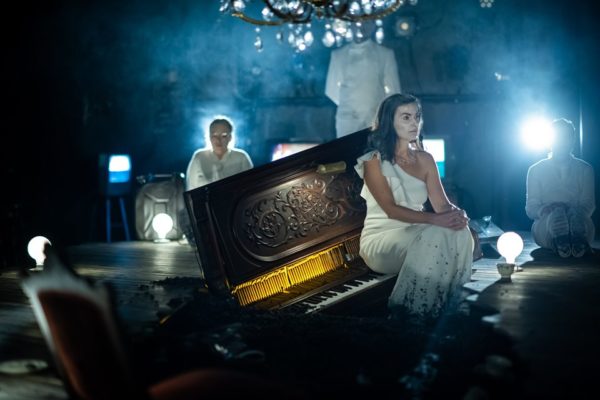Theater Review: “The Stone” — Nobody is Innocent
By Erik Nikander
This marvelous production pulls off a tricky balance — vibrant bursts of creative energy are put at the service of illuminating the thorny nature of memory and guilt.
The Stone by Marius von Mayenburg. Directed by Igor Golyak. Staged by Arlekin Players Theatre at the Studio 368 at Hillside Avenue, Needham, MA, through June 9. (These performances are in Russian with audio-translation in English. The show will return September 13th – 22nd in English.)

A scene from Arlekin Players’s production of”The Stone.” Photo: Arlekin Players.
The Arlekin Players production of Marius von Mayenburg’s The Stone is, in a word, bold. The script tackles rich. relevant, and meaningful themes, and Igor Golyak’s captivating visual approach does the material justice . The play bears a certain resemblance to recent New Rep production We Will Not Be Silent, in that both plays address the legacy of Nazi terror in a way that resonates with the current moment to a distressing degree. That said, Silent tells a relatively straightforward story of one woman’s struggle against injustice; The Stone is more akin to a theatrical puzzle box that confronts audience members with a fragmented family history, challenging them to find moral clarity amid a miasma of lies and exploitation.
In 1935, German couple Witha (Darya Denisova) and Wolfgang (David Gamarnik) buy a house from a Jewish couple so that they can flee to America and escape Nazi persecution. Years later, after Wolfgang is killed in the war, Witha is forced to leave the home with her young daughter Heidrun (Viktoriya Kovalenko). They eventually return, once Heidrun is grown and expecting a daughter of her own, Hannah (Olga Sokolova). In 1993, Hannah’s teacher asks her to tell the story of her role model and Heidrun suggests she choose Wolfgang because of his noble deeds. But, as Hannah learns more about the past, she grows less and less certain of the virtue of her family’s legacy.
To say much more than that would be to ruin part of what makes The Stone such an engrossing evening. The play jumps back and forth chronologically, gradually revealing a saga that plays out over six decades. It’s as if we’re peeling bandages away from a wound that refuses to heal until we’re left witnessing the full extent of the injury. The Stone engages with the evils perpetrated by the Third Reich, so its vision of mankind doesn’t shy away from humanity’s darkest misdeeds. Still, there is a valuable lesson here: an example of the damage that can be done when a family (or a nation) decides it’s easier to whitewash past mistakes than acknowledge the truth. Given that America seems determined to influence Venezuela’s current leadership (after our disastrous Reagan-era meddling in Latin America), the show’s warning against amnesia worth is one current theatregoers ought to hear.
None of the female protagonists in The Stone is anything close to an ardent Nazi. They were passive participants carried along by history, innocent of anti-Semitic hatred yet perfectly willing to profit from its aftermath. Denisova and Kovalenko layer their performances with hints of unease and residual guilt. They also take on the additional challenge of playing their characters at vastly different ages, completely altering their physical bearing and vocal delivery to make each stage of life distinct. We follow Witha from youthful innocence to war-hardened tenacity and, finally, to the emotional freedom provided by grandmotherhood. Heidrun, at first a timid child left fatherless by war, grows into a proud woman determined to defend her family’s honor. We don’t experience their transformations in linear fashion, but the actors portray their time-hopping arcs with purpose and clarity.
As Hannah, Olga Sokolova at first exudes deftly childish impudence but, as the play progresses, she beings to realize that she may not be able to trust the world she thought she knew. She learns the full extent of her family’s history as we do — which adds considerable emotional power to her journey. Though Wolfgang comes off as a ghost or a memory throughout much of the story, David Gamarnik gives the figure a memorable verve, ensuring that the patriarch’s influence over the family continues long after his death.

A scene from Arlekin Players”s “The Stone.” Photo: Arlekin Players.
In fact, Golyak stages scenes so that, even when certain performers aren’t ‘on-stage,’ they are treated as lingering visual presences, stirring off in the shadows while other characters interact. This is a brilliantly dramatic touch: Mieze, the Jewish woman who initially owns the house, is visible throughout the play; she sits motionless, eyes brimming with righteous judgment. Rimma Gluzman supplies Mieze with a heartbreaking aura of tragedy mingled with dignity — her presence leaves a haunting, indelible imprint.
Golyak’s visual imagination in this production is striking, to the point of being hard to shake off. Scenographer David R. Gammons’s set consists of a wide, oval-shaped platform with a central “garden” opening filled with grey detritus. The stage is surrounded by CRT televisions; video director Vladimir Gusev uses the screens to play hidden-camera shots of the action along with trippy scene-transition clips that are accompanied by Jakov Jakoulov’s heart-pounding music. Jeff Adelberg’s lighting work bathes the stage space in a colorful, shadowy ambiance while Nastya Bugaeva dresses the principal characters in white clothing that is stained at its edges by streaks of dirt – a clever metaphor for the tarnished souls of the ‘innocent.’
While the show’s overall style is resolutely distinctive, from time to time the visuals and jagged narrative rhythm becomes a bit too alienating — the audience isn’t just distanced (a la Brecht) from the action, but pushed away. Scenes flash by in such quick succession that, on occasion, confusion results. Several longer dialogue exchanges, especially between Witha and Heidrum, break from this skittery norm; they prove that there’s plenty of emotional material for the show to dig into. It’s hard not to wish the staging took the time to do so more often. But this is a minor quibble. The Stone is never less than theatrically compelling. This marvelous production pulls off a tricky balance — vibrant bursts of creative energy are put at the service of illuminating the thorny nature of memory and guilt.
Erik Nikander is a critic, playwright, and filmmaker based in the New England area. His film criticism can be read on Medium and his video reviews on a variety of topics can be viewed on Youtube at EWN Reviews.
